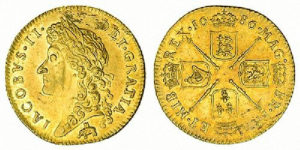The USPTO refused to register the mark GUINEA for, inter alia, collectible coins, deeming the mark merely descriptive under Section 2(e)(1). Applicant East India pointed out that a “guinea” is a gold coin issued in England from 1663 to 1813, and it contended that “guinea” is an obscure foreign term. Examining Attorney Maria-Victoria Suarez pointed out that one of applicant’s products is a replica of the historic guinea. How do you think this came out? In re The East India Company Holdings Pte. Ltd., Serial No. 85505335 (August 10, 2016) [not precedential].

Applicant maintained that the guinea coinage was never circulated in the United States, and that the Examining Attorney relied mainly on foreign websites to explain the meaning of the term “guinea.” The Board was not impressed, particularly because the relevant American consumers are coin collectors, not the general public.
Moreover, the Examining Attorney established that:
[e]ven after the coin ceased to circulate, the name guinea was long used to indicate the amount of 21 shillings (£1.05 in decimalised currency). The guinea had an aristocratic overtone; professional fees and payment for land, horses, art, bespoke tailoring, furniture and other luxury items were often quoted in guineas until a couple of years after decimalisation in 1971. It was similarly used in Australia until that country went to decimal currency in 1966.
Applicant’s website offers a “2015 One Guinea Gold Proof Coin,” and states that “the Guinea is one of the world’s most famous coins.” The Board observed that applicant’s website alone is sufficient to establish that the term “guinea” immediately conveys to coin collectors that the product being offered is a replica of a guinea coin.
The Board brushed aside applicant’s claim of ownership of an EU registration, which served as the basis for the U.S. filing, pointing out that once an application is filed in the USA it must meet the eligibility requirements for registration.
And so the Board affirmed the refusal to register.

